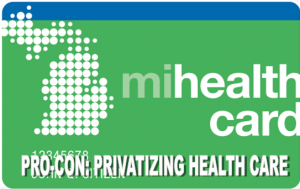PRO: We should privatize healthcare
February 16, 2017
Americans are divided on a variety of issues as Donald Trump begins his presidency, and one of the major controversies is his pledge to repeal and replace the Affordable Care Act. Universal healthcare advocates argue that the complete privatization of the industry is an idea of the rich and greedy and tend to ignore the unjust consequences of socialized medical structures like the ACA. Although there is no easy solution to the nation’s flawed healthcare system, it is important to avoid a doctrine that relies on taking the money from one person’s pocket to put it in another’s.
On the surface, the notion that healthcare is a human right seems compassionate, and if money was an unlimited resource and people had a natural inclination to work without incentives, universal healthcare would be a viable option. Each dollar the government spends on coverage, however, is taxpayer money. This has caused premiums to skyrocket for the middle class since they subsidize lower wage earners. In this way, long-term “free” health care disincentivizes working and earning a livable income for beneficiaries of this service. In fact, a Congressional Budget Office report found that a majority of people would prefer to maintain their current income level instead of increasing their earnings in order to remain eligible for health care subsidies or Medicaid. Another study by the Heritage Foundation reported that in 2014, only 32% of work-eligible households supported by government assistance were engaging in work activities. As the government makes it easier for people to live with a low income, there will be less of a cause for people to seek higher-paying jobs.
Current HealthCare.gov television commercials show individuals and families thrilled to receive subsidies which dramatically reduce their monthly premiums, sometimes to $0. What’s not shown is how the plan is funded. The average monthly premium for the lowest-level bronze plan in 2017 for a non-subsidized 30-year-old enrollee is $311, of which ABC News estimates 78% pays for the individual’s health care plan and the remaining 22% helps fund the public costs of the ACA. The commercials also fail to show the system’s unsustainability. With the higher wage-earners paying substantially higher premiums, this redistribution of wealth will eventually reduce the funding source. In the words of former British prime minister Margaret Thatcher during a 1976 TV interview, “The problem with socialism is that you eventually run out of other people’s money.”
In an Iowa democratic debate, Bernie Sanders said the United States is “the only major country on earth that doesn’t guarantee health care to all people as a right, not a privilege.” However, that is not bad thing considering the benefits of privatizing the healthcare industry. In these cases, people have more freedom in physician choice and are able to decide their quality of care. The middle class improves as they avoid high premiums and higher taxes. For example, Britain has a universal healthcare system for which every citizen pays through a national income tax. The tax rate for middle class families there is 20 percent of their entire income: a full 15 percent more than America’s current rate at the same income level, showing how much America’s middle class would have to sacrifice for an equivalent system. Patient care can also improve under a private system. A 2015 NCBI study revealed that in India, which is working on developing their private insurance sector, people with private insurance actually receive better provider care than those with public insurance. When Sanders and his supporters use the common argument that the United States should follow the trend to match other major countries, they avoid discussing the multitude of reasons as to how this is not in our best interest.
As supporters of the law claim the plan is working, they should consider what this means. Although it is true that more people are insured than before, the 16.64 million-person figure used to show the number of people gaining coverage includes not just lower income people who needed it, but also middle class families who had previously chosen not to purchase insurance but now have to by law to avoid paying a fine. The figure also includes those who were temporarily without insurance due to a job change or other life event and would have acquired it regardless of the law’s enactment. The Affordable Care Act penalizes those who do not purchase insurance, essentially forcing them to purchase something they don’t want. As family income increases, middle class members pay a higher penalty in order to offset low-income insurance beneficiaries. Defenders cite the statistics in a wrongfully positive tone, ignoring the fact that the law removes the option to save money and causes many middle class families to make the purchase out of obligation as the penalty costs the same as having the insurance.
Additionally, stating that those without insurance were denied health care prior to the enactment of the Affordable Care Act is a false claim. Those who qualify for Medicaid were offered basic care at specified practices, and emergency rooms were required to stabilize all people. In Kalamazoo County, there are city-funded practices and others where doctors donate their time and services, offering free clinic days to low income residents. Similarly, schools provide dental care and vision screenings.
Contrary to popular belief, the conservative platform does advocate for coverage for the disabled and temporary safety nets which provide help in times of need without disincentivizing work. The healthcare industry should be administered similarly to other industries such as the food industry. Privately run and allowed to be competitive, the food industry is able to flourish because the government is only involved in consumer spending when safety nets are necessary. When applied to the healthcare system, this would lower prices, allow for more freedom in physician choice, and generally would not force people to pay for another person’s coverage. Despite the lack of a simple fix to the broken medical system, it is important that the country’s leadership is wary of a system that depends on redistribution of wealth to fund the uninsured.









